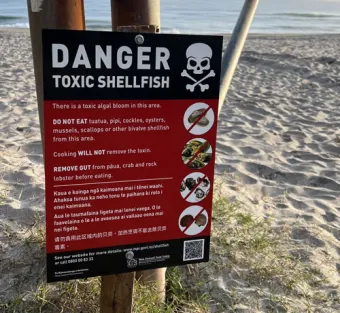
Good water quality is important so people can swim, gather kai, and enjoy local waterways and beaches.
Over summer, Bay of Plenty Regional Council staff collect water samples from popular swimming spots to check health risks. These samples are checked for faecal contamination (E. coli or Enterococci bacteria) and/or for toxin-forming algae (cyanobacteria). The monitoring information is shared with Bay of Plenty and Lakes Public Health Service who analyse the results and issue a public health warning if unsafe levels of bacteria or toxic algae are found. For example, Sullivan Lake in Whakatāne has a permanent health warning in place.
Rivers, streams, lakes, and beaches can be affected by rain and human activity. After rain, local waters can become cloudy and bacteria levels may increase. It’s best to wait a few days after rain before swimming, as run-off from farms and urban areas can take time to clear. Even if the water looks clean, bacteria levels can still be high.
If you see signs of an algal bloom and there’s no health warning in place, it’s best to play it safe and avoid contact with the water – especially if you have allergies or a weakened immune system. Swallowing water with toxic algae can cause vomiting, diarrhoea, stomach pain, cramps, nausea, and other symptoms. Skin contact can irritate your skin, eyes, nose, and mouth. Dogs are especially at risk from toxic algae, as they often scavenge and play near water.
You can check the latest swimming suitability gradings and water sampling results on the Land, Air, Water Aotearoa (LAWA) website – Can I swim here?
If you’re fishing or gathering shellfish, check the Ministry for Primary Industries (MPI) website for public health warnings first. MPI monitors shellfish for poisoning risk caused by naturally occurring toxic algae blooms. If you experience symptoms like numbness, tingling, confusion, fainting, or breathing problems after eating seafood, seek medical help immediately. You can also check Health New Zealand’s website for public health alerts.
To report environmental damage – whether it’s in the air, on land, in waterways, or along the coast – call Bay of Plenty Regional Council’s Pollution Hotline 24/7 on 0800 884 883, or you can use their online form to report non-urgent issues.
